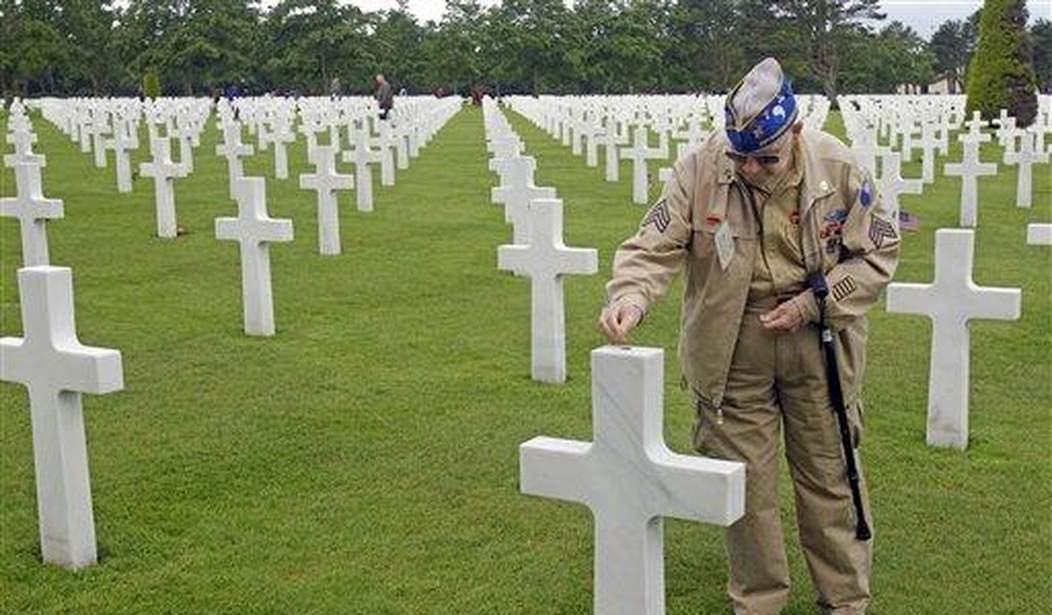It was 77 years ago on June 6, 1944, that a quarter million Allied troops stormed the beaches of Normandy to begin the long, bloody campaign to take Europe back from the Nazis. It was a remarkable feat of logistics, then and now. More than 566,000 tons of supplies were ferried across the English Channel in the first 27 days after the landing, supplying a million men who eventually took part in the initial stages of the Normandy campaign.
But there, on the beaches of Normandy just after dawn on June 6, the war was decided. While some of the British and Canadian troops were able to land and begin to move inland by mid-morning, the Americans on Omaha beach were getting mowed down by German machine guns at a frightening rate.
Pinned against a seawall, the few Americans who managed to survive uninjured were getting picked off by German snipers or blown up by German mortars. There were no orders, no directions from command, just individual men whose nation had prepared them to improvise.
So that’s what they did. Small groups began to assault the German pillboxes that continued to pour murderous fire onto the beaches. Others followed their example. Slowly, painfully, the troops on Omaha Beach began to clear German resistance. That they eventually succeeded was no cause for celebration. They knew there would be another battle, and another, and many more before they could go home.
Veterans of that fight don’t like to talk about it much. They never accepted “the hero” label that everyone wants to hang on them. They prefer to say that those who didn’t come home are the real heroes.
The memorials have been cut short this year. In Normandy itself, there was only a small memorial service. The pandemic is still raging in France and authorities reluctantly refused to allow visitors.
But taking part in one of the French remembrances was 96-year-old American Charles Shay. Shay lives in Normandy and became the only living participant at the D-Day cemetery service in Carentan.
Under a bright sun, the 96-year-old Penobscot Native American from Indian Island, Maine, stood steadily while the hymns of the Allied countries were played Friday in front of the monument commemorating the assault in Carentan that allowed the Allies to establish a continuous front joining nearby Utah Beach to Omaha Beach.
Shay regretted that the pandemic “is interrupting everything.” He is expected to be the only veteran at Sunday’s anniversary day ceremony at the Normandy American Cemetery of Colleville-sur-Mer.
It’s estimated that only about 2,500 survivors of the D-Day assault are still alive. Will anyone remember them and what they did after they’re gone?
“In France, people who remember these men, they kept them close to their heart,” Shay said. “And they remember what they did for them. And I don’t think the French people will ever forget.”
It’s hard to forget that the word “courage” came alive that day. Up and down the coast of Normandy, young men performed incredible acts of courage. Sometimes, these were the last acts of their lives. Sometimes they acted to save a friend. But those acts of courage said something strong and good about those young Americans.
Today, “courage” is defined differently, as I wrote 15 D-Days ago.
Too often, we use that word in a base and cavalier way. A Hollywood movie star has “courage” because she revealed to the world that she’s a drug addict. A comic has “courage” because he made fun of the President of the United States to his face. A filmaker has “courage” because he made millions of dollars shooting a “documentary” which shows the US government complicit in the mass murder on 9/11.
And so instead of “courage” being a word with inexpressible significance and meaning beyond its simple definition, it has become a self-congratulatory epithet, a hollowed-out expression of empty promise and insincerity. Today, the purveyors of myth and shapers of opinion use the word to tell the rest of us who to admire and what to respect. No longer does courage imply sacrifice or a willingness to give all that one has for a cause greater than oneself. Instead, courage defines the selfish desires and overwrought egos of an ideology that sees more irony in the word than reverence.
The men of Omaha Beach brought the word “courage” to life. Although most of them are gone, their example should inspire us to reach outside of ourselves and stand for something greater than the ordinary. They may have been ordinary men. But they performed extraordinary feats and should always be remembered for that.









Join the conversation as a VIP Member